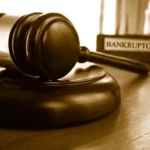Tax Liens
Massachusetts Bankruptcy Lawyers Anthony Bucacci and Robert Simonian (508)673-9500
Tax Liens in Chapter 7 Bankruptcy
Find out if your tax lien will remain after Chapter 7 bankruptcy.
The primary reason people file Chapter 7 bankruptcy is to discharge, or eliminate, their debts and get a fresh start with their finances. Tax liens, however, are not discharged simply by filing bankruptcy. Tax liens continue in effect after a Chapter 7 filing until they are paid off or otherwise released.
This article will focus on federal tax liens. Similar principles apply to state tax liens. Laws vary from state to state, however, on specific issues such as how state tax liens are created and what property they cover.
What Is a Tax Lien?
A lien is a security interest, or claim, against specific property. A home mortgage, for example, is a lien against a residence. If you don’t pay the debt, the creditor can sell the property that is subject to the lien to get reimbursed.
A federal tax lien is like a mortgage, except that it secures your obligation to the IRS instead of a lender. A tax lien can be imposed if you fail to pay taxes on a timely basis. However, just because you owe taxes does not mean that you are subject to a tax lien.
How state tax liens are imposed. Laws vary between states as to what is required to impose a state tax lien.
How federal tax liens are imposed. The IRS file a notice in order to get a federal tax lien against your property. The notice must be filed in the county where you live or where the property is located. Once the IRS files its notice, it has a lien against all property — real or personal — that you own. The lien attaches to all property that you own from and after the date that the IRS files its lien. Federal tax liens continue in effect for up to 10 years after the IRS assesses the taxes that you owe.
What Happens to Tax Liens When You File Chapter 7 Bankruptcy
What happens to tax liens when you file for bankruptcy depends on whether or not the tax lien was in place before you filed for bankruptcy.
Tax Liens Imposed After Your Bankruptcy Filing
Filing Chapter 7 triggers a statutory protection known as the automatic stay. The automatic stay bars creditors, including the IRS, from taking action to collect most types of debt except through the bankruptcy process.
Among other things, the automatic stay bars the IRS from filing a tax lien postbankruptcy. This means that the IRS cannot impose a tax lien during your Chapter 7 case unless it previously filed a notice.
Tax Lien Notices Filed Before Your Bankruptcy Filing
A tax lien filed before your bankruptcy, however, continues in effect. The bankruptcy court cannot set aside a tax lien as long as it was filed properly before your Chapter 7 case.
Paying Off Tax Liens Through Bankruptcy
Tax liens may be paid, in whole or part, through the bankruptcy process. A bankruptcy trustee is appointed after you file Chapter 7 to administer and liquidate assets in your bankruptcy estate to raise money to pay your debts. In some Chapter 7 cases, debtors have assets that the trustee can sell to pay creditors, including the IRS. The IRS is entitled to any money raised through the sale of assets covered by a federal tax lien except to the extent there are prior mortgages or security interests.
Example. Say your house is worth $350,000 and is subject to a $100,000 mortgage and a $75,000 federal tax lien. Let’s assume that you are entitled to a homestead exemption of $100,000. If the bankruptcy trustee sells your home, the trustee would pay $100,000 to your mortgage lender and $75,000 to the IRS. The trustee would also pay you $100,000 for your homestead exemption. The balance of $75,000 would go to pay costs of sale and other creditors in your bankruptcy case.
When Tax Liens Are Not Paid Through Bankruptcy
Unfortunately, tax liens usually are not paid in Chapter 7 cases. Most Chapter 7 cases are “no asset” cases. In a no asset case, creditors receive nothing because there is no property that the trustee can sell for the benefit of the bankruptcy estate after taking into account secured claims (like mortgages and tax liens) and exemptions. Ordinarily, trustees will not attempt to sell property if all of the proceeds would have to be paid to secured creditors or the debtor.
Example. Let’s take the example of a house worth $200,000, with a $150,000 mortgage, a $25,000 federal tax lien, and a $100,000 homestead exemption. In most cases, the trustee would not try to sell the house, because there would be no proceeds available to pay other creditors after taking into account the mortgage, tax lien, and homestead exemption.
In this situation, the tax lien would still remain on your property after your Chapter 7 case is over. In order to get rid of the lien, you could sell the property and pay the IRS from the proceeds. Or, you could attempt to work out a payment plan with the IRS to pay the balance due and have the tax lien released. Simply filing Chapter 7, however, would not make the lien disappear.
Tax Liens on Personal Property
Tax liens also attach to personal property, such as cars and household furniture. In most Chapter 7 cases, trustees do not try to sell personal property, because it is either worth too little, encumbered by liens (like auto loans), or subject to exemptions. You have to continue to deal with tax liens that cover personal property you are able to retain after a Chapter 7 filing.
Dealing With Tax Liens After Bankruptcy
Generally, your options to deal with a federal tax lien that remains in effect after bankruptcy are as follows:
- pay the tax lien and obtain a release
- negotiate a payment plan or compromise to release the tax lien
- redeem a specific item by paying its value, as determined by the bankruptcy court, to the IRS
- pay the tax lien over time by filing for Chapter 13 bankruptcy after your Chapter 7 (this is often referred to as a “Chapter 20” bankruptcy), or
- do nothing and gamble that the IRS will not take action to collect on its tax lien.
Taking no action can make sense when the value of property subject to a tax lien is relatively nominal and your personal liability for the tax obligation was discharged through your Chapter 7 filing. (Learn more about when tax debts can be discharged in bankruptcy.)
Source : nolo.com






